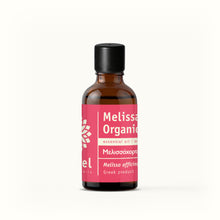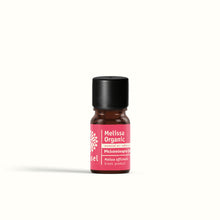Greek Melissa Organic Essential Oil
Regular price
€32.00
Sale
If you are interested in buying larger size quantities we would love to receive your email at info@vessel.gr
Greek Melissa Officinalis Essential Oil
Batch: E1001928



Real, unadulterated, distilled essential oil of Melissa.
Other common names: lemon balm, bee balm
Botanical name: Melissa officinalis
Botanical family: Lamiaceae
Method of extraction: Steam distillation
Plant part used to extract the oil: Aerial parts
Cultivation method: Organic
Area of origin: Greece
Historical notes:
The name ‘Melissa’ was known even before what we know as the ‘ancient Greece’. There are many versions of the story about the mythological character Melissa. Apparently she was a nymph, a daughter of a Cretan king Melissos who cared for an infant Zeus. The story has it that she discovered the sweet tasting honey and fed it to Zeus together with goat’s milk.
Melissa ended up being transformed into a beautiful bee and from her bees were believed to have received their name.
Melissa is a common female name derived from the Greek word μέλισσα (mélissa), "bee," which in turn comes from μέλι (meli), "honey."
Biochemical group: Aldehyde
Main chemical compounds: citronellal, geranial, neral, methyl cirtonellate, germacrene D, trans-β-ocimene, citronellol, others
Colour: clear
Consistency: thin
Aroma strength: medium/strong
Perfumery note: top/middle
Aroma: fresh, herbaceous, lemony
Traditional aromatherapy uses:
- Traditionally in aromatherapy treatments melissa is associated with the following therapeutic properties: analgesic, anti-anxiety, anti-bacterial, anti-convulsant, anti-depressant, anti-fungal, anti-inflammatory, anti-microbial, anti-spasmodic, anti-viral, bactericidal, immuno-stimulant, hypotensive, nervine, sedative, tonic
- Qualified aromatherapists may use melissa essential oil for common complaints such as:
- skin conditions: herpes simplex (cold sores)
- musculoskeletal system: aches and pains, tension and inflammation
- digestive issues: digestive cramps, indigestion
- emotional issues: stress, insomnia, anxiety, nervousness, calming, soothing, enhancing cognition/focus
- insect repellent
- others
- How we use it:
Please, also see our How to Use Essential Oils Safely page for more information.
- For cold sores - add melissa essential oil to an unscented face cream and carefully apply directly to the cold sore
- For respiratory allergies such as hay fever – vaporise a drop together with some Organic lavender. This combination is also great for stress and anxiety
- For digestive cramps – dilute together with a drop of Peppermint or some Mandarin or sweet orange essential oil in a fixed oil (carrier oil) and gently massage the lower abdomen in a clockwise direction.
Safety considerations:
Melissa essential oil can interact with drugs/medication (such as diabetes drugs and others) and there is a risk of teratogenicity (A teratogen is an agent that can disturb the development of the embryo or foetus. Teratogens halt the pregnancy or produce a congenital malformation/birth defect).
Melissa essential oils should not be used on the skin of infants and children under 2 years of age or on those with hypersensitive/diseased/damaged skin.
Recommend maximum dermal use level for Melissa essential oils is 0.9%. Reading Tisserand and Young's full profile is recommended. [Robert Tisserand and Rodney Young, Essential Oil Safety (Second Edition. United Kingdom: Churchill Livingstone Elsevier, 2014), 350-351.]
Please, also see our How to Use Essential Oils Safely page for more information.
Research and studies:
- Apoptosis-inducing effects of Melissa officinalis L. essential oil in glioblastoma multiforme cells.
https://www.ncbi.nlm.nih.gov/pubmed/24745610
- In Vivo Potential Anti-Inflammatory Activity of Melissa officinalis L. Essential Oil.
https://www.ncbi.nlm.nih.gov/pubmed/24381585
- Pharmacological profile of essential oils derived from Lavandula angustifolia and Melissa officinalis with anti-agitation properties: focus on ligand-gated channels.
https://www.ncbi.nlm.nih.gov/pubmed/18957173
- Melissa officinalis oil affects infectivity of enveloped herpesviruses.
https://www.ncbi.nlm.nih.gov/pubmed/18693101
Margaret Pawlaczyk-Karlinski MSc. (Hons.), Cert. Ed., M.I.F.A., NHS reg.

















